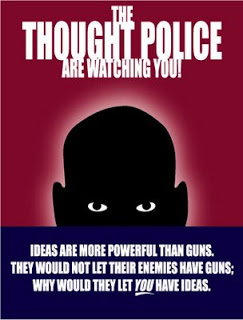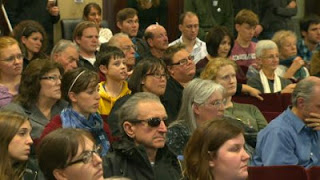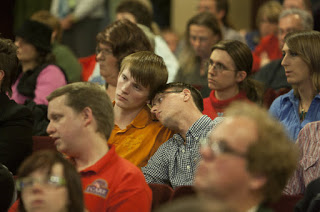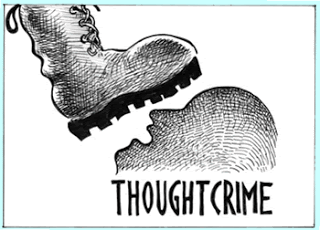Friday, November 16, 2012
Boise’s Proposed Thoughtcrime Ordinance

“Law is concerned with external behavior and not the inner life of man.”
— Justice Felix Frankfurter, West Virginia Board of Education v. Barnette (dissent)
Ordinance O-36-12, a proposed municipal “anti-discrimination” measure being considered by the Boise City Council, would do nothing to protect people from acts of criminal violence. Instead, it would mandate the use of state-sanctioned aggression against business owners who refuse the commercial patronage of gay, lesbian, and bisexual people.
If government has no authority to criminalize private behavior between consenting adults, by what supposed authority can it punish people who withhold their consent from a commercial transaction? Proponents of the ordinance intend to bury that question beneath a blizzard of bromides about tolerance and respect.

About a year ago, City Council President Maryanne Jordan was approached by two Boise residents who claimed to have been assaulted because they were gay. They also claimed that they were afraid to report the crime out of fear that they might suffer repercussions if they went public about their lifestyle. Jordan says this prompted her to devise a measure that would ban discrimination based on “sexual orientation and gender identity or expression” in housing, employment, and public accommodations.
Jordan didn’t disclose any of the details of the alleged assault during the November 13 City Council hearing on the proposed ordinance. In this sense the story told by Jordan is typical of what the Boise Weekly calls “anecdotal reports” that “suggest a recent increase in hate-based crime” against gays and lesbians. Those unconfirmed reports have allegedly grown in number since the last time the state legislature refused to add the category of “sexual orientation” to the state anti-discrimination ordinance.
This suggests one of two possibilities: Either Idaho has a sub-population of violent bigots who are oddly fastidious about following the state anti-discrimination law, or the people who are seeking to change the state law aren’t terribly fastidious about telling the truth.
Idaho was among the first states to enact a “hate crimes” law. According to the most recent official tally, hate crimes – a category that includes rude comments – are all but nonexistent in Idaho. This offers a powerful argument on behalf of the second of the possibilities listed above. That argument was augmented by the turnout at the November 13 Boise City Council meeting.

According to Boise’s NBC affiliate, “There was a line out the door, and also an overflow room for those who came for the reading [of the measure].” Literally hundreds of gay and lesbian people came to offer testimony and public support on behalf of a measure they claimed was necessary because they were paralyzed with fear over the public disclosure of their sexual identity.
“I think what you are seeing is a group of people who are finally getting the chance to stand in front of an elected body and tell their story,” insisted Mistie Tolman, co-founder of the Add the Words Campaign (which has lobbied to change the state anti-discrimination law). “So they are coming out in droves to tell them what it’s like not to have those protections.”

Those who testified on behalf of the anti-discrimination measure weren’t boldly confronting a hostile Sanhedrin. Every public official at the event expressed support for the proposed ordinance. Boise Mayor David Bieter, who later said he was “honored” to take part in the hearing, made a point of letting the audience know that its input wasn’t necessary, and that the proposed change could be made without public testimony.
Two more public meetings on the measure are scheduled, but the outcome of this process is as predictable a Jay Leno punchline.
What happened on November 13 at Boise City Hall was not a deliberative political function. It was a peculiar kind of revival meeting in which the faithful gathered to declaim against the sin of discrimination – a form of iniquity they seek to eradicate through the righteous and compassionate exercise of official coercion.
As the term is commonly used, discrimination could sometimes be considered sinful. There are situations in which it may constitute a tort. It is never a crime – that is, an act of fraud or violence that injures the property rights of another human being.
A political government may issue edicts against discrimination, and enforce them through the application of aggressive violence. But no government has the power to turn it into an actual crime, any more than it can alter the law of gravity by an official edict.
The only legitimate function of political government, assuming that one exists, is the protection of property rights. Boise’s proposed anti-discrimination ordinance is rooted in the denial of property rights, which – when exercised by insufficiently progressive people – are believed to undermine “fair and equal treatment” of sexual minorities and the “city’s economic well-being.”

According to Mayor Bieter, the anti-discrimination ordinance “makes good business sense, because as we look to attract new jobs and businesses, we must demonstrate that Boise offers the same protection as other cities. In short, discrimination is bad for business and counter to our shared ideals.”
Like nearly everybody else in the political class, Bieter neither understands, nor cares to learn, how the market functions. If discrimination is truly “bad for business,” then profit-minded businessmen won’t discriminate – and the market will reward them.
Nearly every public figure who has endorsed the anti-discrimination measure has taken refuge in a bizarre dialect that is equal parts civic boosterism and cultural bolshevism. Boise is a great and wonderful city, they insist, but it will reach its potential only if its economy is artfully managed by the wise and visionary people who rule it. This will mean, among other things, using government power to identify those who harbor views at odds with the new cultural consensus, and catechizing them at gunpoint until they recant their political heresies.
A year ago, the same civic savants who are promoting the “business-friendly” anti-discrimination ordinance imposed a ban on smoking in both public bars and private clubs. That prohibition, which was also advertised as a way of improving Boise’s business climate, had the predictable effect of driving many club owners into financial ruin.
Individuals who violate the smoking ban face a $69 fine for each infraction – a much milder penalty than the one prescribed for business owners who are accused of violating the anti-discrimination act.
The ordinance would apply to housing, employment, and “public accommodations.” An employer, landlord, or businessman could be found in violation of measure without committing an overt act. All that would be necessary is a complaint filed by someone who takes offense over another person’s refusal to engage in commerce.
 |
| Thoughtcriminal Elaine Hugenin and husband. |
One illustration of how this would work is offered by the case of New Mexico resident Elaine Hugenin.
In 2006, Hugenin, a wedding photographer, was approached by a woman named Vanessa Wilcock, who wanted to hire her for a “commitment ceremony” with her same-sex partner. Hugenin declined, politely explaining that she was willing to forgo that business opportunity in order to be faithful to her religious commitments.
Where the natural law is concerned, the matter ended there. Nobody’s rights were injured, and Wilcock was free to solicit the services of another photographer. Rather than doing so, she and her partner decided to enlist the state to punish Hugenin for her thought crimes. They filed a discrimination complaint with the state’s “Human Rights Commission,” which ruled in their favor and imposed a $6,600 fine on the photographer because she had declined to engage in what should have been a voluntary commercial transaction. (It’s worth noting that New Mexico, like Idaho, does not formally recognize “same-sex marriage,” which means that the state engages in the same form of discrimination for which Hugenin was punished.)
 |
| Vanessa Wilcock |
The Hugenin case is headed to the New Mexico Supreme Court, which means that it is and will continue to be a huge financial drain on the very limited resources of a small business owner.
Mayor Bieter and the architects of Boise’s anti-discrimination measure would probably reply that the victim was to blame for her plight, and that people who run afoul of the Boise ordinance would be able to avoid serious punishment if they would simply submit to re-education.
Boise residents found guilty of discrimination would face up to a year in jail and a fine of up to $1,000 – unless they agreed to government-imposed “sensitivity training,” in which case they would be subject to a $100 penalty and be required to sign an agreement “to not engage in discriminatory practices in the future.”
Significantly, section 6-02-05 of the draft ordinance stipulates that “There shall be no right to a trial by jury for an infraction citation or complaint.” This provision is facially incompatible with Article I, section 7 of the Idaho Constitution, which dictates that “The right of trial by jury shall remain inviolate” in all criminal cases.

It’s also worth noting that under Boise’s municipal code, sexual orientation discrimination would be treated as an offense as serious as an act of physical assault. What this means is that a landlord who declined to rent a home to a same-sex couple could spend as much time behind bars as an assailant who actually committed an act of physical violence against them.
Thomas Jefferson famously said that his neighbor’s religious beliefs didn’t matter to him because they neither picked his pocket nor broke his leg. To be a crime, an act must involve aggression against the person or property of another human being – that is, it must entail either pocket-picking or leg-breaking. Boise’s proposed anti-discrimination measure, like similar enactments elsewhere, would empower uniformed leg-breakers to pick the pockets – and incarcerate the persons – of residents whose only offense would be to conduct their business and private affairs peacefully in accordance with their religious and moral beliefs.
Discrimination isn’t a crime. However, seeking to punish it certainly is.
Dum spiro, pugno!
Content retrieved from: http://freedominourtime.blogspot.com/2012/11/boises-proposed-thoughtcrime-ordinance.html.



